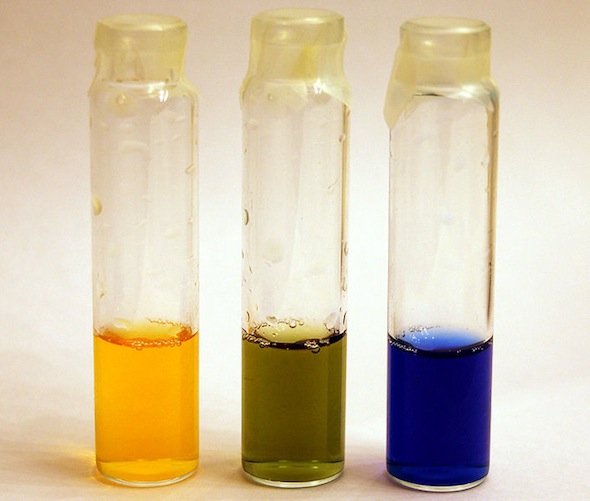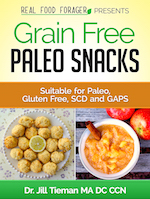There is a fine line between being too acidic or too alkaline. One indication of this is reflected in the fact that the PH of the blood is in a very tight range — between 7.35 and 7.45. If the PH of the blood varies by more than two tenths it can be fatal. Consequently, the innate wisdom of the body will do everything in it’s power to maintain a blood PH of 7.40. This is achieved by a complex choreography between the acidifying and alkalizing capacities of the cells, tissues and organs, in response to digestion and other metabolic reactions.
Acidifying Agents: Strong Acids
Substances that acidify the body are not acidic themselves — actually, just the opposite. For example, citrus fruits are acidic when measured. However, when we eat citrus fruits, they act as an alkalizing agent in the body, because the responds to the acid by forming an alkalizing agent (bicarb).
The main acidifying agents in the body result from the digestion of proteins and grains. There are three strong acids: sulfuric acid, phosphoric acid and nitric acid. These are strong enough to burn a hole in your clothes.
Acidifying Agents: Weak Acids
Weak acids, such as vinegar and citrus juices do not ionize — or break apart completely in solution — whereas strong acids do. Vinegar is not strong enough to burn a hole in your clothes because it does not break apart completely into an acid and a base part. It remains as a salt. A salt is formed when an acid and a base combine and neutralize one another.
Weak acids serve to alkalize your body by supplying more minerals to it. Weak acids like the acetic acid in vinegar, and the acids in citrus fruits, contain minerals which are basic (alkaline), along with their weak acid part. The weak acid part combines with water and is converted into carbonic acid which then breaks apart into carbon dioxide and water. You eliminate this waste product by breathing out the carbon dioxide through the lungs and passing the water out through the kidneys. The minerals remain behind to replenish deficient minerals.
The Problem With Strong Acidifiers
The strong acids are excreted as sodium, potassium, magnesium or calcium salts. The sulfur in sulfuric acid combines with the calcium and magnesium from the bones, and is excreted as the corresponding salt — calcium sulfate and magnesium sulfate. These salts do not harm the kidneys, but eventually they can deplete these alkalizing minerals in your body. This is why a high protein diet may be a contributing factor to osteoporosis. A high grain diet may act in the same way.
If there is too much protein in the diet a latent acidosis may occur (not related to acute blood acidosis which is a medical emergency). This is the same as being too acid or alkali deficient.
Organ of Schade — The Largest Organ in the Body
Did you know that there is an organ in the body that is actually larger than the largest commonly known organ — the skin? In Europe it is called the colloid connective tissue organ of SCHADE. It is also known as the prekidney because it catches acids through its vast network of collagen fibers — much like a collagen scaffolding that holds the cells in place. These fine fibers act as a holding tank for excess acids that must be kept out of the blood — in order to maintain the 7.40 PH — as they wait for processing by the kidney.
Interestingly, there is a daily rhythm to the acid/alkaline balance in the Organ of Schade. At approximately 2 AM the urine is the most acidic because the acids are mobilized while we sleep. Consequently the first morning urine is the most acid and rightly so. The urine from the second void is a true reflection of the PH of the body fluids at that time. This second urine should be around 6.7 – 7.0. Many time it is not, because most people are too acid.
Digestion in the Stomach
Hydrochloric acid is produced by the parietal cells of the stomach from salt — sodium chloride. This molecule is split and the chloride and sodium ions become hydrochloric acid and sodium bicarbonate, respectively. These two molecules are produced in a one to one ratio.
The HCl goes into the stomach and the sodium bicarbonate goes into the blood stream, circulates around, seeking the excess acid from the tissues and the colloidal connective tissue organ. Any excess bicarb, is picked up by the alkaline glands: the salivary glands, the gall bladder system, glands in the pylorus (the part of the intestine the stomach is connected to) the liver, pancreas and alkaline glands in the duodenum.
The alkaline component comes from eating enough alkaline forming foods — such as, raw vegetables and fruits and fermented foods and beverages.
An imbalance develops if not enough alkaline forming food is eaten and the sodium bicarbonate generated by the stomach’s cells does not reach the alkaline glands. Some of the alkaline minerals may also get used up in neutralization of acid residues from previous meals that were stored in the connective tissue organ.
Acid Reflux
If there is not enough base left over after your meal to neutralize and clear the acids stored in the connective tissues, a relative latent acidosis (or base deficiency) develops. The liver and pancreas won’t be able to produce adequate alkaline juices to properly digest the food in the next step along the route of digestion.
In this situation, in order to proceed with proper digestion, the stomach has to produce more acid, in order to make enough base. If you remember, the HCl and the bicarb are produced in a one to one ratio. In this way one can develop reflux or even stomach ulcers — very common complaints. The problem is not the result of too much acid, au contraire, it is the result of too little base!
In response, the stomach makes excess acid in order to generate the amount of bicarb it needs to balance the acidity from the foods eaten. It becomes a vicious cycle of trying to generate more bicarb, but generating more acid at the same time.
In addition, because there is an imbalance in the acid/base, pathogenic bacteria start to populate the stomach and esophagus where they are not supposed to be and contribute to symptoms.
The Solution
The solution is to eat more alkaline forming foods. Most people eat more acidic forming foods from proteins and grains and processed foods and not enough vegetables to neutralize it. One of the best ways to get more alkaline forming foods into your diet is to eat more fermented or cultured foods.
A very easy and tasty beverage to incorporate into your daily diet is … kombucha! I bet you knew I would say that! Kombucha is a great way to add enzymes, probiotics and it is alkaline forming in the body! Start by taking an ounce or two with meals and soon you will see a difference in your digestion!
Have you had an improvement in your digestion with kombucha? Please leave a comment and share your experience with us
This post is shared at: Tasty Traditions, Creative Juice Thursday, Simple Lives Thursday, Thank Your Body Thursday, Keep it Real THursday, Pennywise Platter, Fresh Bites Friday, Fight back Friday, Tasteful Tuesday, Traditional Tuesday, Hearth & Soul Hop















